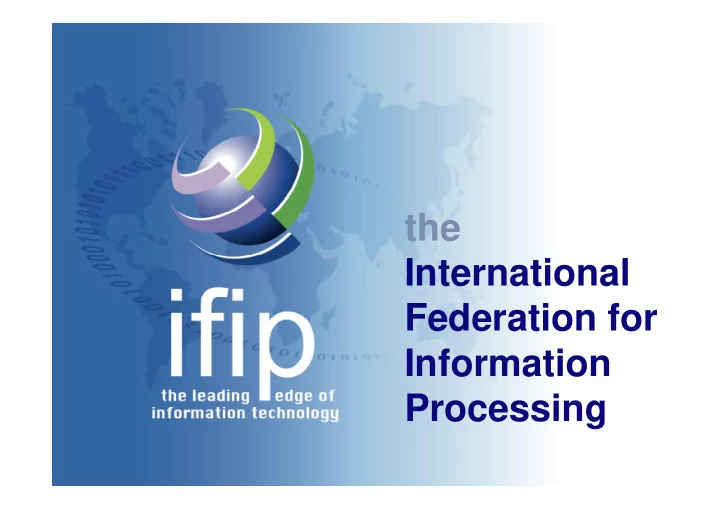

the International Federation for Information Processing
n is a non-governmental, not-for-profit umbrella organisation of national learned societies working in the field of Information Technology (IT) n was established in 1960 under the auspices of UNESCO as a result of the first World Computer Congress held in Paris in 1959
IT Societies from 56 countries or regions Andorra Czech Republic Korea Slovakia Members Argentina Denmark Lithuania Slovenia Australia Ethiopia Malaysia South Africa Austria Finland Mauritius Spain Belgium France Netherlands Sri Lanka Botswana Germany New Zealand Sweden Brazil Greece Nigeria Switzerland Bulgaria Hungary Norway Syria Canada Iceland Oman Thailand Chile India Poland United Kingdom China Ireland Portugal USA based / ACM CLEI Italy Russia USA based / IEEE Croatia Japan Serbia Zambia Cyprus Kenya Singapore Zimbabwe Affiliate IT international or regional organisations CEPIS IMIA SEARCC VLDB
General Assembly [Representatives of Member Societies, and TC Chairs] Organisation Chart Council [Executive Board, and Trustees] Executive Board President Four Vice-Presidents Secretary Treasurer IFIP Secretariat Standing Committees Technical Assembly Activity Management, Marketing, Admissions, Publications, Developing Countries Support, 13 Technical Committees Statutes and Bylaws, Finance, 97 Working Groups Congress Steering, Member Society Relations, Awards
Technical Committees TC1 Foundations of Computer Science TC2 Software: Theory and Practice TC3 Education TC5 Computer Applications in Technology TC6 Communication Systems TC7 System Modelling and Optimization TC8 Information Systems TC9 Relationship between Computers and Society TC10 Computer Systems Technology TC11 Security and Protection in Information Processing Systems TC12 Artificial Intelligence TC13 Human-Computer Interaction TC14 Entertainment Computing
TC10 Computer Systems Technology WG 10.2 Embedded Systems WG 10.3 Concurrent Systems WG 10.4 Dependable Computing and Fault Tolerance WG 10.5 Design and Engineering of Electronic Systems
TC10 Computer Systems Technology To remain attractive in the future, new areas should be investigated in the existing working groups. 10.2: “Wearable Computing” (computing devices to carry n around, posing specific questions related to I/O devices, size, weight and power consumption), sensor networks 10.5: “Green Computing” (larger computer systems like n server farms consume significant amounts of electrical power, which should be reduced) 10.3: “Grid/Cloud Computing” (where both data and n algorithms might not be local to a particular computer, but might be distributed over the internet).
TC10 Computer Systems Technology New technical areas should evolve into IFIP working groups through the following process: Discussion among WG members, creation of a special n interest group (SIG) for new topic in WG, definition of aims and scope Bring in the community for this topic by inviting influential n experts into the SIG, start organising technical events Once enough activity/momentum is created, potentially n upgrade SIG to WG status
Within IT member societies find a forum for sharing n experience, and discussing challenges and opportunities TCs and WGs contribute to, and often lead, n progresses in the state-of-knowledge and state- of-the-art: voluntary work of its WG members is catalysed into creative synergy, with societal relevance
Forum for technical discussions among n selected top experts in a field selected by the members of the WG Offer to Framework to organise workshops, summer n WGs schools, conferences etc. within a stable and respected international organisation (fee to IFIP depends on kind of sponsorship by IFIP, IFIP can also provide loan to cover up-front costs) Central publications contract with Springer to n publish conference proceedings and other books (45 free proceedings for conference, royalties per published page to IFIP and TCs) Digital library for on-line publishing (dl.ifip.org, n still to be improved) Funding for best paper awards, student travel n grants or support for speakers from developing countries
IFIP wants to improve its offering to volunteers for the organisation of conferences etc. Some work items under discussion: Ongoing Moderated Wiki to support first-time n Discussions conference organisers Collection of mailing lists to directly market n IFIP events to past IFIP event participants New financial model for events considering n fees to IFIP, risk sharing arrangements etc., insurance for conference organisers Standard terms for conferences in n cooperation with IFIP member societies like IEEE-CS or ACM Improve digital library offering n Plagiarism guidelines (including self- n plagiarism and guidelines for reviewers)
Like any organisation, IFIP has to balance n income and costs With a wider time horizon, income and costs n are balanced, however, with a negative trend Operations in recent years that has to be reversed KEUR Income Expenses Result 600 500 400 300 200 100 0 -100 2003 2004 2005 2006 2007 2008 2009 -200
Fixed costs of IFIP (secretariat) are covered by n dues from national societies Event proceeds and royalties to cover projects n like developing country support, student travel Operations grants, best paper awards, conference insurance, … Income Expenses TCs Event Proceeds Digital Library Member Secre- Society tariat Dues Projects Publication Royalties Other admin. Other costs Income
Increasing the offering of IFIP to the technical n community (e.g. financial backup for commercial risk of conferences, travel cost support for TC and/or WG meetings, …) requires to create Financial matching income streams Conside- Events only deliver an income to IFIP if IFIP is a n rations main/full sponsor. Co-sponsorship by IFIP is possible at no cost to conference organiser, but also doesn’t provide income stream to IFIP for providing services. Publications deliver an income to IFIP if the n publication is done through IFIP’s official publications contract (at this time with Springer). In addition, IFIP can provide publishing through its digital libary.
Recommend
More recommend